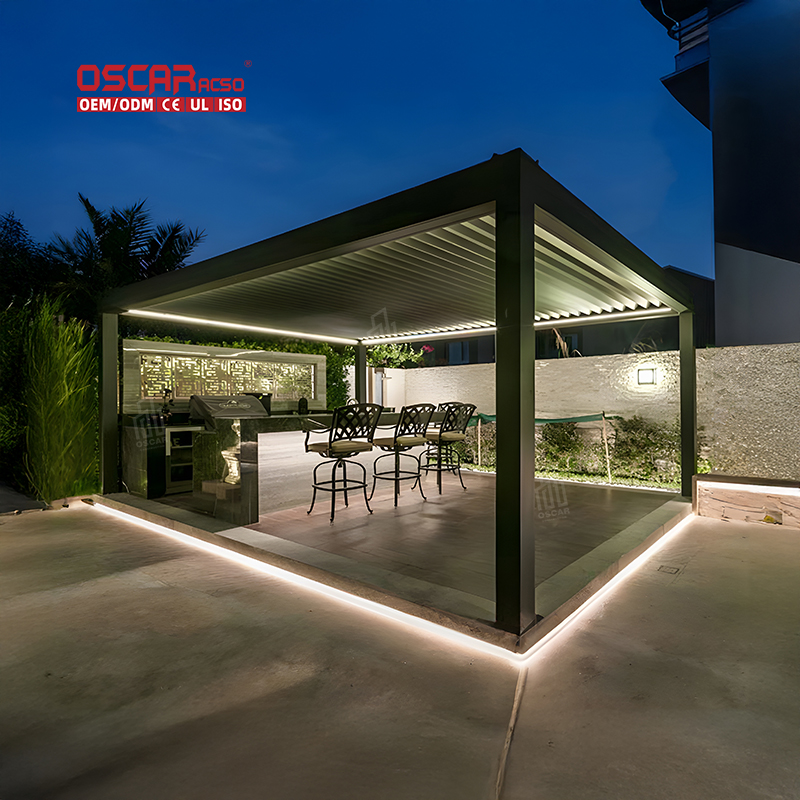Pergolas in the Rain, Smart Solutions for a Dry Outdoor Experience
A common question among homeowners is: what happens to my pergola when it rains? The straightforward answer is that ...
A common question among homeowners is: what happens to my pergola when it rains? The straightforward answer is that a standard, open-roof pergola will not provide complete protection from rainfall ☔️. However, with thoughtful design, the right accessories, and modern materials, you can absolutely transform your pergola into a sheltered haven that allows you to enjoy your outdoor space, rain or shine. Let’s explore how.
.jpg)
Why Standard Pergolas Aren’t Waterproof 🤔
By design, most traditional pergolas feature an open slatted or lattice roof. This structure is perfect for providing dappled shade and supporting climbing plants, but it’s not intended to be a solid shelter. During rain, water will naturally fall through these gaps.
Some lower-quality pergolas might even experience leaks from cracks or seams, with one user review noting that ”rain came in from every single crack and ran down support poles” on a particular model . This open design means that while you might get some light protection in a drizzle, you and your furniture will likely get wet in a steady rain.
The key takeaway? Manage your expectations. A basic pergola is an aesthetic structure that defines space and offers some sun protection, but it is not a waterproof gazebo or a solid-roof patio cover without modifications .
Your Guide to Waterproof Pergola Solutions 🛠️
The good news is that you have a plethora of options to make your pergola rain-resistant. The best choice for you depends on your budget, desired aesthetics, and how much light you still want to filter through.
👉 Retractable Canopies & Awnings
These offer fantastic flexibility. You can extend a waterproof fabric canopy when the skies darken and retract it to enjoy open-air sunshine. They are often made from durable polyester or vinyl and can be attached with ropes, screws, or Velcro tabs .
👉 Solid Roofing Panels
For a more permanent solution, consider installing solid panels over the pergola’s framework.

- •
Polycarbonate Panels: A popular choice as they are lightweight, durable, and allow light to filter through while keeping rain out. They offer excellent resistance to impact and UV rays .
- •
Corrugated Metal or PVC Panels: These provide robust, long-lasting protection from the elements. Metal roofs are particularly effective in areas with heavy rainfall, though they may require protective coatings to prevent rust .
.jpg)
👉 Louvered Roof Systems
This is the premium, high-tech option. Louvered roofs feature adjustable slats that you can open to let in sun and breeze or close to create a watertight seal against rain. Many come with built-in gutters and downspouts that discreetly channel water away, often through the structure’s legs, keeping the area underneath dry without any visible drainage pipes .
👉 Waterproof Shade Sails
For a modern and stylish look, strategically angled shade sails made from waterproof PVC-coated polyester can be installed overhead. They not only protect from rain but also add a striking architectural element to your space .
The Critical Role of Drainage and Slope 📐
Adding a roof cover is only half the battle. Proper drainage is essential to prevent water from pooling, which can lead to leaks, structural damage, or overwhelming your gutters.
Many well-designed pergolas, especially those with louvered systems, incorporate a built-in drainage system that hides within the beams and columns, seamlessly directing water to the ground .
If you’re building new or modifying your structure, incorporating a slight slope (a pitch of 15-30 degrees is ideal) is highly recommended. This angle encourages water to run off efficiently rather than pool on top of any flat surface .
For any pergola with a solid cover, consider adding gutters and downspouts to manage runoff effectively and protect the foundation of your structure and the surrounding patio .
Choosing the Right Materials for Rain Resistance 🧱
The material of your pergola itself impacts its longevity in wet conditions.
- •
Aluminum: Arguably the best choice for wet climates. It is naturally rust-resistant, durable, and requires minimal maintenance. It often supports modern features like louvered roofs .
- •
Vinyl & Composite: These synthetic materials are highly resistant to rot, insects, and moisture damage, making them a virtually maintenance-free option .

- •
Wood: Offers a classic, natural look but requires the most upkeep. Woods like cedar and redwood have some natural resistance, but must be regularly treated with water-repellent sealants to prevent swelling, warping, and rot . Pressure-treated lumber is a more durable option for wood enthusiasts.
Maintenance Tips for Long-Term Protection 🔧
To ensure your waterproof pergola continues to perform, a little routine care goes a long way.
- •
Regular Inspections: Check your canopy, panels, or louvers for any wear, tear, or damage before and after the rainy season.
- •
Keep Gutters Clear: Ensure that gutters and downspouts are free of debris like leaves and twigs to allow for free water flow.

- •
Clean Surfaces: Gently clean polycarbonate panels or fabric canopies to prevent dirt and mold buildup that can degrade materials over time.
- •
Reapply Sealants: For wood structures and fabric covers, reapply waterproofing sealants or treatments as recommended by the manufacturer to maintain their protective barrier .
Even the best-protected pergola might allow some moisture in during a heavy downpour, so it’s wise to choose outdoor furniture made from water-resistant materials like teak, aluminum, or resin wicker .
With the right approach, your pergola can become a versatile extension of your living space. It’s not about fighting the rain, but rather working with smart design to create a comfortable oasis regardless of the weather. The sound of rain on a canopy overhead can actually become one of the most peaceful experiences your garden has to offer.

